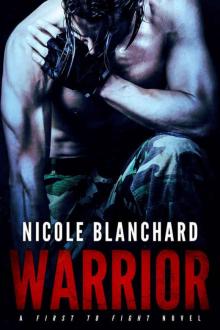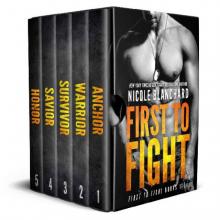- Home
- Nicole Blanchard
Anchor (First to Fight Book 1) Page 2
Anchor (First to Fight Book 1) Read online
Page 2
I’d always been a demonstrative girlfriend, and then fiancé, and I’m not ashamed to admit it. I doled out affection without a thought as to keeping it all to myself. Thomas was always a guy who never got enough and took everything I had to give without much in return. My mouth drops open and I shake my head.
I can’t believe it took me learning about his impending nuptials to realize I deserve so much better.
“Is there anything else?” I ask when he doesn’t say anything.
He frowns. “No, that’s it. I didn’t want you to hear it from someone else.”
“Yeah, I appreciate it,” I say and then I start forward. “I really do need to go before I’m late.”
When he doesn’t make a move to get out of my way, I roll my suitcase right around him.
I don’t bother saying goodbye, I don’t even turn and look back. I learned my lesson and it’s not one I will forget: love and relationships are overrated. When I’m in the car, I focus on navigating traffic and checking the clock. Thomas and that part of my life are history and I’m putting them behind me.
According to the schedule Sienna printed out for me, I have ten minutes to make it to the ferry before it takes off and it’s the last one scheduled to go out before the long holiday weekend. The docks are packed with people. Families heading to the island for summer vacation, co-eds for the parties, and businessmen for exclusive retreats. I navigate through the crowd with practiced ease and make it to the on-boarding area with minutes to spare.
It’s a beautiful day and as I wait for the attendant to take my money and hand me change, I lift my face into the sea breeze, determined to enjoy the moment and put the past where it belongs—behind me. I take the change and roll my things to the gate where a crowd of people wait to walk up the ramp to the ferry. They haven’t started boarding, so I’m in luck.
While I wait, I give myself a few minutes of time to think about Thomas and his confession. I’m pleased to find I don’t feel like breaking down into a sobbing mess. If anything, a weight has been lifted off my shoulders and for the first time in a long time, there’s a bounce in my step.
As people in front of me move forward, I smile at a little girl holding a stuffed wolf who is in line in front of me and she smiles back, showing two missing front teeth. Her mother stands next to her, frowning into her cell phone.
She’s just redialing a number when a man bumps into her. The mother glances over and apologizes, but the man doesn’t seem to pay her much mind. In fact, he walks with grim determination to the boarding ramp, skipping everyone in line.
I step out of the line to express my indignation at his rudeness when he turns and I realize he’s holding a gun.
Gabriel
The boating safety class I teach runs long. In part because the students are curious, but the real reason is because I love being on the water. It’s what inspired me to join the Marines after high school and what cemented my decision to volunteer for the Coast Guard when I got out. And I’ll admit to myself, though I’d never say it aloud, I kinda enjoy the teaching aspect, too. Something I never got to do in the Marines. Badasses don’t like being told when they’re doing something wrong.
“If you have questions,” I say when the chatter has died down, “please don’t hesitate to give me a call and stay safe out there.”
I leave before anyone can bring up the search and rescue missions, which seem to be a hot topic among the safety courses. Most of the instructors don’t mind chatting about it afterward, but makes my skin crawl. I scrub a hand over my face as I walk down the hall to the exit. Whispers follow behind me and I don’t have to guess what they’re talking about.
It was easier when there was an enemy to face. When the bad guys were bad guys. People. Living, breathing things I could combat with weapons.
A mission is so much easier to complete when the bad guys stay down after a shot to the head or the heart. Combatting an enemy with no end, no conscience, and even less regard for human life than any degenerate I’ve ever come across is infinitely harder.
The elements don’t have compassion. The ocean doesn’t give a rat’s ass about the lives it takes.
It’s unforgiving. Relentless. Never-ending. Unconquerable.
And I both love and hate it.
Until a few months ago, I enjoyed battling the unpredictability, pitting my will against it. It is the ultimate rush.
Until I realized I could never stand a chance against Mother Nature.
The shack on the beach, where I run the part-time tourist business that pays the bills, offers little reprieve from the late summer sun. Its neon colors have long since faded from the combination of wind, salt, and water to ghosts of their former selves, the wood worn smooth by the constant breeze from the water. A lone figure rests against the counter flirting up a pretty customer.
My mood lifts when I recognize the old man, his customary bottle of Coke, and his lazy smile. “Don’t let him lie to you,” I say to the girl. “He doesn’t even work here.”
Tyler snorts. “I’m here more than you are, I might as well work here. Here are your keys, darlin’, the rental lasts through the day. Key return is at five on the dot.”
She smiles at him and flounces off with two of her giggling girlfriends.
“Official business?” I say and nod to his police uniform. He and my dad were on the local force—which isn’t saying much since the edges of the island are within spitting distance of each other. He’s more like an uncle and has made it a point to keep tabs on me ever since my parents died in a freak boating accident a couple years ago.
“Sure,” he says as he pops open a soda from the mini fridge I keep below the counter. “Ready to spread ‘em?”
A plane buzzes over our heads, but I dismiss it as another advertisement or parasailing operation running in loops across the beach. Gulls caw in the distance and circle around forgotten snacks for their lunch. A car beeps, but it sounds far away. Above all is the constant rush of waves smashing into the surf. It was a sound that used to haunt me, but one I can’t quite escape on the island.
Tyler offers a soda, and I drink it in a few gulps. “You’re living the dream, man,” he says as he sips his own. “Come and go as you please, a new hot woman every night. Fuck, I hate you.”
A list of the day’s activities sits on the counter and I shoot him a disbelieving look as I glance over it. “I doubt you’ll be in possession of your balls tomorrow if your wife ever hears you say something like that.”
Tyler winces. “You’re probably right.” He smiles, his otherwise hard eyes going soft. “God bless her.”
Paperwork is the least favorite of my many responsibilities, so I always save it for last. Tyler likes to come at the end of his shift to keep one eye on the beach bunnies while the other watches his back. His wife, Selena, is a sweet lady, but she has a mean side. They’ve been happily married for twenty years and it’s sort of a running joke on the island that he has a wandering, but harmless, eye. As long as I’ve known him, he’s loved Selena to tears.
It’s the relationship I always thought I wanted. Unfortunately, marriage turned out to be a whole other beast altogether. One I’m more than relieved to stay away from.
We bullshit for the next hour until my phone bleats out a familiar ringtone. Tyler gets a call on his radio at the same time.
The squall didn’t listen to the forecasts because it’s headed right for us—from the Atlantic side—and a couple of vacationers are trapped in the vicious waves.
A familiar rush of fear and excitement washes over me.
“Guess we’re closing early,” I say to Tyler.
A few hours later, I stumble back to my house for a shave and a change of clothes. I’m cutting it close, too close, to my pick up time for Emily. The small boat caught way too far off the coast due to the weather, took a lot more time to locate than we’d expected due to signal interruptions and a damn uncooperative tropical storm. We found the tourists healthy and uninjured. The storm bl
ew itself out, leaving a sunny evening for Emily’s ride over to the island on the ferry.
But I don’t think Taylor will care about the weather or the lives we saved.
She won’t hear anything from my explanation other than the “I’m late.” My hope is she’s joking about taking me back to court about custody.
Somehow I don’t think it was an empty threat.
Another helicopter roars overhead, but I pay it no mind as I hurry to let Rudy piss before shutting him up in his cage until Em and I get back. By the time I get him fed and watered and left whining in the bathroom, my phone has rung multiple times.
I can already imagine Taylor’s high-pitched voice screeching over the line, so I’m not in any rush to answer it and by the time I’m in my truck and on the road, I forget to call her back.
A news anchor blares out a headline, but I’m in a hurry, so I turn the volume down to a low murmur as I drive the cramped winding roads to the docks where the ferry should be waiting. If I’m lucky, they are running late and haven’t gotten there yet. Taylor has to ride over with Emily and then take the last ferry out, so if they get there before I do, I’m sure to get an earful. If she misses her trip back, we’ll be stuck on the island together, and neither of us wants to spend more time together than we need to.
The roads are more crowded than usual. It’s like a mass exodus of cars and I have to fight in bumper to bumper traffic to get to the docks. You would think there was a celebrity coming to Rockaway Island, for Christ’s sake. I didn’t even know there were so many cars on the island.
It’s the third helicopter that has my brain switching from panicked about being late, and pissing Taylor off, to alert and focused. When the traffic clears, I see three police cruisers parked haphazardly over the sidewalk and then dread balls up in my stomach like a hissing, venomous snake ready to attack me from the inside out.
In my career, intuition has always served me well. When you’re in the middle of a gun fight, cornered, and don’t know where to go, sometimes all you can do is trust your gut. So far, it hasn’t led me wrong.
When ice forms in my chest and a cold sweat slicks my skin, even in the ninety-degree weather, I know something’s wrong.
Then, I notice the helicopters. They weren’t planes advertising free facials or declaring some idiots eternal love like I’d thought earlier. They were from the sheriff’s department, and various television stations.
I slam my car into a parking stop, not giving a damn about the handicapped spot. Fuck the fines.
I spot Tyler’s bald head above the crowd and elbow my way through the gawking spectators to where he stands with a dozen other uniformed cops. His expression when he finds me is grim. In all the years I’ve known him, I’ve never seen him look so devastated, including the night he had to deliver the news my parents were dead.
That’s the second clue shit’s about to go bad. Tyler can always be counted on to bring levity to any situation so when he’s serious, everyone around him takes on the same energy. It’s what makes him such a great cop, a great leader, and an even better friend.
By the time I reach his side, three more helicopters have flown overhead, and my anxiety has grown through the roof. All of the aerial activity is focused on one spot across the spit of ocean. The copters circle overhead like vultures and the distant whine of their beating blades reminds me a little too much of war in the Middle East.
As if it knows it, my body reacts without thought. My muscles go loose and wired, ready for action at a moment’s notice. I pick up shreds of conversation from the crowd milling around the gathering of cops. All of my senses are on hyper-alert.
So when my phone goes off again, my heart threatens to jump out of my chest.
I turn to Tyler, who is still looking at me with a solemn expression on his worn features. For the first time since I’ve known him, he looks every day of his fifty years. “What’s going on?”
He takes a moment to answer, then puts his hand on my shoulder. Tyler’s a great guy, a good friend, but he’s not the type for physical affection between men.
“It’s the ferry,” he says. Then my phone rings again. “You should answer your phone.”
My brows furrow as I try to puzzle out what one has to do with the other. I swipe a thumb over the unlock indicator and fifteen missed calls from Taylor appear on the screen. I open the voicemail and find a dozen or so messages blinking for my attention. They all last for a couple seconds at most.
Damn if my finger doesn’t tremble when I swipe over the first message and hit play.
I raise the phone to my ears and all of the outside noise seems to fade away as the message plays.
Out of all the horrors I’ve witnessed and the atrocities I’ve committed, there has never been anything more terrifying in my life than the moment my daughter’s voice screams, “Daddy!” in my ear.
Chloe
The gunman directs the rest of us in line to get on the boat before we attract too much attention. He points the gun in each person’s face and based on his own expression, he won’t hesitate to use it at the first sign of reluctance.
The dock isn’t empty, there are people milling about everywhere. People getting on and off their own boats in distant slips. Official looking attendants checking new patrons in and out.
Any of them could be a potential rescuer. But if I call out, what will happen?
I’ll get shot, or they will, and then there will be more innocent people in danger. The little girl will still be way too damn close to a deadly weapon—or worse. I don’t want to speculate about the possibilities, but it’s hard not to.
Before I have another panic-stricken moment to think, the woman and her daughter reach the man with the gun. The girl is crying and when it’s her turn to board the ferry, she freezes, her little pink tennis shoes clinging to the dock, and her small frame shaking. Her mother ferrets away the little phone behind her back as they get closer. Her daughter whimpers, shaking so hard I can hear her teeth clack together.
“Sweetie,” her mother says with a tone of desperation. “C’mon, Emily.” She tries to stay calm, tries to keep her emotions reigned in, but her voice breaks mid-sentence and her own tears slip down her cheeks.
“No, Mommy. I don’t want to,” she says. “I want Daddy.” She clutches the little wolf like a lifeline and my heart twists inside my chest. “Daddy!” the little girl cries.
Her mother’s face drains of all remaining color, but she manages to slip her phone into her pocket before bringing her trembling hands in front of her.
He says nothing, but his silence is enough. Like a dark, ominous storm cloud, he hovers over the trembling child and gestures with the gun for them to get a move on.
My hands are clammy and I can’t get rid of the moisture collecting on my palms, even when I rub them against my dress. I don’t want to draw attention to myself, I don’t want the gun to jerk in my direction.
I learn a lot about myself in the following seconds, as I’m sure many do when confronted with life or death situations.
When the little girl doesn’t take the step forward, her mother pleads with her in hushed tones, but to no avail. The gunman’s face reddens, his eyes bouncing from face to face until he lands back on the girl. His attention is the last thing she needs if she’s going to make it out of this alive.
He takes a step forward and jerks the mother away from her kid. She fights like a feral alley cat, clawing at his face and shrieking. She screams, drawing the attention of the people around us and faint sounds of alarm erupt at the sight of the gun. It’s a surreal picture, seeing a gun in broad daylight with the sounds of happy families and boats, and the cheerful caw of sea birds in the background.
The man growls and then pushes the mother off the dock where she tumbles like a rag doll down into the choppy blue of the ocean, flipping once, moving all too fast and slow at the same time. Her scream cuts off with a loud thunk and a gurgle of water. A mushroom of red mixes with the froth left in her wa
ke. She must have knocked against the dock or the boat. Either way, a couple seconds pass and she doesn’t resurface. For one terrible second, I think she may be dead.
Forgetting the danger and the inevitable fatal repercussions, I scream to the nearest bystander who’s close to where she fell. “Help her!” I point at the bubbles floating to the surface. “Help! Help her!”
Not one, but two men jump in after her. They either don’t see or don’t care about the man waving a gun. One of them gets an arm under her shoulders and swims her over to a ladder alongside the dock. I can’t tell from the distance if she’s breathing or not, but they’ve got her. They’ll get her help. There’s nothing else I can do for her. I push her limp body from my mind and zero in on the screaming little girl.
Her feet are glued to the planks as she cowers in front of the man, a tiny figure shadowed by his hulking form. Her little body shakes with the effort of her screams. Heads turn in our direction, and her scream resounds through the mouths of every person in the vicinity. Like osmosis, the alarm travels until everyone takes notice.
The people behind me take the chance at escape and flee while the gunman is focused on the little girl. I hear their footsteps slap against the sea-worn wooden planks. My feet itch to follow in their swift retreat, but I can’t leave her alone.
I can’t leave her alone.
Before I can second-guess my decision, I cross the space between us and move the girl’s trembling body behind me.
“Leave her alone,” I say. My heart is hammering its way through my chest and I can taste the salty essence of tears on my lips. I didn’t even know I was crying.
He twitches a finger over the trigger and the sound of the safety flicking off echoes over the crash of the waves against the dock. I stumble backward, but he stops me with a growled, “Get on the boat.”
I swallow around the knot in my throat. “L-let the little girl g-go,” I say.

 Frenemies
Frenemies Deal with the Dragon (Immortals Ever After Book 1)
Deal with the Dragon (Immortals Ever After Book 1) Friends with Benefits (Friend Zone Series Book 3)
Friends with Benefits (Friend Zone Series Book 3) Spark (The Hometown Heroes Series)
Spark (The Hometown Heroes Series) Traitor (Last to Leave Book 1)
Traitor (Last to Leave Book 1) Reckless: A Salvation Society Novel
Reckless: A Salvation Society Novel Friend Zone (Friend Zone Series Book 1)
Friend Zone (Friend Zone Series Book 1) Friend Zone Series Box Set
Friend Zone Series Box Set Savior (First to Fight Book 4)
Savior (First to Fight Book 4) Toxic
Toxic Warrior (First to Fight #1)
Warrior (First to Fight #1) Mechanical Hearts (Skeleton Key)
Mechanical Hearts (Skeleton Key) First to Fight Box Set: Books 1-5
First to Fight Box Set: Books 1-5 Bear With Me (Woodland Creek)
Bear With Me (Woodland Creek) Darkest Desires (The Club #14)
Darkest Desires (The Club #14) Anchor (First to Fight Book 1)
Anchor (First to Fight Book 1) Survivor (First to Fight Book 2)
Survivor (First to Fight Book 2)